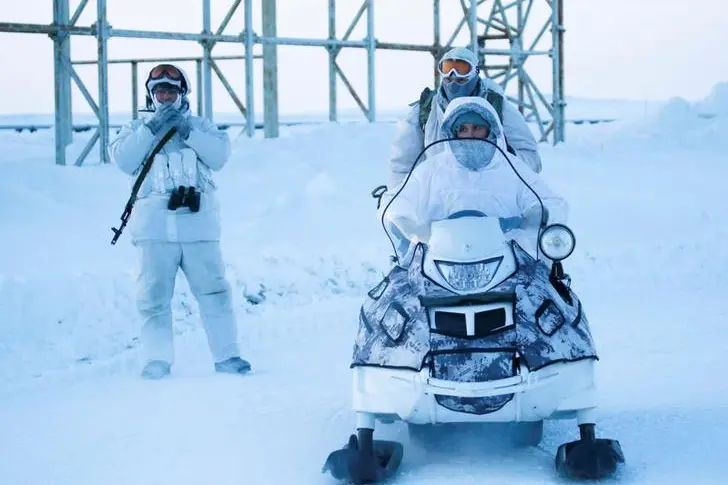PHOTO
Russia conducted a major military exercise in the Arctic last week. Much of the exercise took place near the Franz Josef Land archipelago, where Moscow maintains an important military base.
The Russian Ministry of Defense released a video showing a brace of MiG-31 fighter jets flying over the North Pole. The same footage also showed three nuclear submarines smashing through the Arctic ice and surfacing alongside one another.
President Vladimir Putin was pleased. He referred to the training event as “unprecedented” and instructed his nation’s navy chief “to continue Arctic expeditions and research in the far north to help ensure Russia’s security.”
Military exercises in the Arctic are no surprise. The region, commonly referred to as the High North, is becoming more contested than ever before. The region is one of the least-populated areas in the world, with sparse nomadic communities and few large cities and towns. However, the region is rich in minerals, wildlife, fish and other natural resources.
According to some estimates, up to 13 percent of undiscovered oil reserves and almost one-third of undiscovered natural gas reserves are in the Arctic. Of course this has caught the attention of the world’s major powers, especially Russia, China and the US.
Moscow sees itself playing an important security role in the region and has invested heavily in militarizing its Arctic territory. Russian infrastructure development and military structuring and procurement have in recent years focused heavily on bolstering the country’s Arctic capabilities.
It now has at least 34 key military installations in or near the Arctic and is optimizing those facilities for cold weather combat. It has expanded the variety and sophistication of its capabilities in the Arctic, while increasing the range and tempo of air and sea patrols in the region, which are often aggressive in nature.
China, meanwhile, also wants to increase its access and influence in the Arctic, primarily for economic reasons. The foundation of Beijing's economic involvement in the region is its so-called “polar silk road.” The goal of this is to complement the country’s Belt and Road Initiative — a vast trading network China is constructing on the Eurasian landmass and beyond — by investing in and constructing major infrastructure projects along emerging sea routes in the Arctic.
Underscoring the importance that Beijing places on its presence in Iceland, the Chinese Embassy in Reykjavik can accommodate a staff of up to 500. The US Embassy there, by comparison, has about 70 staff. In 2013, tiny Iceland, which has a population of slightly more than 340,000 people (the same as a small Chinese city), became the first European country to sign a free-trade agreement with China.
The US became an Arctic power on Oct. 18, 1867, in a ceremony during which ownership of Alaska was transferred from Russia. With the stroke of a pen the Russian presence in North America ended and the US gained direct access to the northern Pacific Ocean, while adding a territory nearly twice the size of Texas for the price of about 2 US cents a hectare.
Washington currently has four main goals in the region. Firstly, ensuring the territorial defense of the US. Secondly, enforcing sovereignty in US territorial waters. Thirdly, meeting treaty obligations in the Arctic region arising from its membership of NATO (five of the world’s eight Arctic countries belong to NATO). And fourthly, ensuring the free flow of shipping and other economic activities in the region.
With this focus on big-power competition in the Arctic, is there a place for Gulf nations in the region? Many Gulf states are looking for ways to transition from being only regional powers and exert more of a global influence. Increased economic activity and energy exploration, along with the effect of climate change in the Arctic, has global implications so it is only natural for non-Arctic countries to take an interest in the region.
One way for Gulf states to get more involved is by applying for observer status in the Arctic Council. Alternatively, the Gulf Cooperation Council could apply. The Arctic Council is an intergovernmental organization led by the eight Arctic states. It focuses on finding opportunities for cooperation on shared interests and concerns in the region. Most of the recent focus has been on improving the safety of commercial shipping, improving the environmental situation, and in promoting economic activity in the Arctic.
The founding document of the Arctic Council explicitly states that it will not address security, defense and military matters. This is one of the reasons why it has been able to operate even though there has been a breakdown in relations between the West and Russia.
Currently, 13 non-Arctic countries have observer status in the council. They cannot vote but can help shape the agenda behind the scenes. Geography is not a factor in obtaining observer status — but global ambition is.
For example, Singapore became an observer in 2013. Geographically, Gulf states are closer to the Arctic Circle than Singapore. With a number of them looking beyond their region and becoming increasingly globally minded, which of them will be the first to apply for observer status?
Despite a great deal of cooperation among Arctic nations and a desire to keep interactions productive, a return to great power competition raises the potential for conflict and confrontation. As nations devote resources and assets in the Arctic to secure their national interests, global attention to the region will only increase in the years to come.
It remains to be seen whether the Gulf states want to be a part of the Arctic debate. If they choose to, observer status in the Arctic Council might be a good place to start.
- Luke Coffey is the director of the Douglas and Sarah Allison Center for Foreign Policy at the Heritage Foundation. Twitter: @LukeDCoffey
Copyright: Arab News © 2021 All rights reserved. Provided by SyndiGate Media Inc. (Syndigate.info).





















